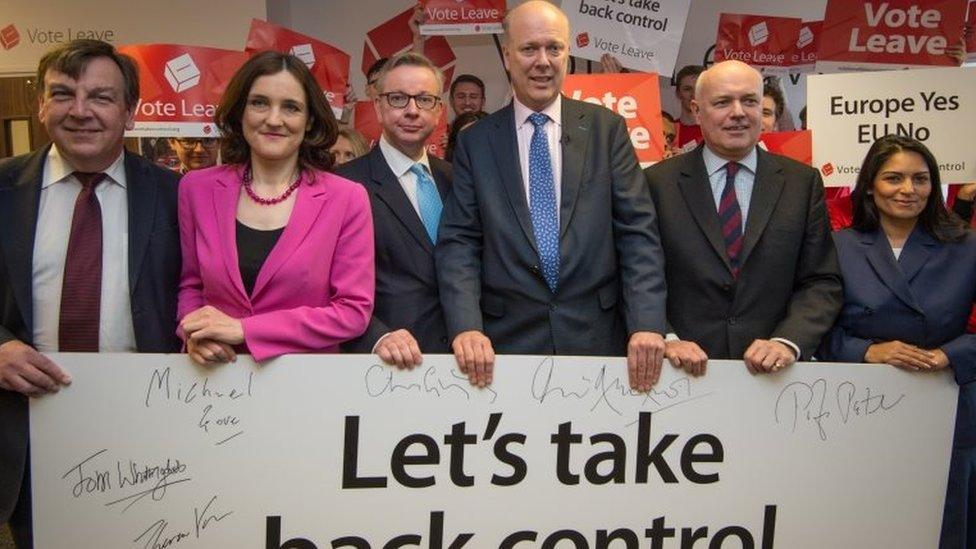Civil servants banned from helping EU out campaigners
- Published

Civil servants have been banned from helping ministers make the case for leaving the EU, prompting claims the establishment is lined up against them.
Michael Gove and other ministers campaigning for Britain's exit will also be unable to use official briefings to prepare campaign speeches.
But civil servants will be allowed to help ministers arguing for Britain to "remain in a reformed EU", No 10 said.
UKIP described the move as a "total stitch-up".
The rule change was announced by Cabinet Secretary Sir Jeremy Heywood.
Downing Street said civil servants and special advisers should not give ministers campaigning for the UK to leave the EU access to government papers, apart from ones they have already seen, on the referendum or David Cameron's EU renegotiations.
But officials should continue to support the ministers in all other aspects of government business in their normal way, a spokesman added.
The Conservative Party is officially neutral in the referendum but the government's official policy is that Britain should remain in the EU - and civil servants are duty bound to support government policies.
Cabinet split
But leave campaigners are likely to argue the move will give the remain campaign an unfair advantage on 23 June's referendum on whether Britain should stay in the EU.

Analysis by the BBC's Deputy Political Editor James Landale
I know of one cabinet minister backing Leave who has chosen to get round all this by bringing in an old friend to act as an unofficial special adviser for the duration.
Other special advisers have been less certain of the rules and have been asking Downing Street what they should be doing. One told me: "We are all rather feeling our way on this."
In truth, Whitehall is not too worried about how the cabinet will operate in the run-up to June 23. This is, after all, a civil service that has had to deal with a coalition government for the last five years and that had a cabinet that was nothing if not divided.
But government is going to be a little edgy in coming months.

Northern Ireland Secretary Theresa Villiers, one of five cabinet ministers to join the leave campaign, said it was another example of the forces against them.
"The leave campaign is the underdog, no doubt about that. Much of the establishment is lined up in favour of EU membership, as they have been in the past," she told BBC Radio 4's The World at One.
The cabinet is split over the issue with 17 full members in favour of staying in the EU and five wanting to leave. Conservative MPs are also split - 142 to 120 at the latest count in favour of staying. David Cameron said on Tuesday he though London mayor Boris Johnson "has got this one wrong" by being in favour of the UK leaving the EU.
David Cameron: Boris Johnson has got this one wrong
In a letter outlining the changes to the civil service code, external, Sir Jeremy said: "Civil servants can draft ministerial speeches and provide briefing on government policy for ministers... including those organised by groups campaigning for the same outcome as the government on the EU referendum."
It says ministers will "be able to take a different personal position from that of the Government on the issue of the EU referendum."
But it adds: "This wholly exceptional arrangement applies only to the question of whether the UK should remain in a reformed EU or leave. All other EU or EU-related business, including negotiations in or with all EU institutions and other Member States, and debates and votes in the UK Parliament on EU business will continue to be subject to the normal rules of collective responsibility and party discipline."
The rules will apply until 28 days before the referendum, when they will be reviewed, he added.
'Insult to democracy'
UKIP MEP Nathan Gill said Whitehall's approach represented an "appalling cover-up" and that people should know what contingency plans the government has made for a UK exit from the EU.
"To not give the public that information in order that they can make an informed decision on such a huge issue is the greatest insult to democracy," he added.
Former prime minister Tony Blair interviewed by the BBC
Elsewhere in the EU referendum debate, former prime minister Tony Blair told the BBC a vote to leave could change the future of the UK by "providing the justification for Scottish independence", warning this would be a "huge mistake for the country".
Mr Blair said he supported Mr Cameron in making the case for a vote to remain, saying the PM had achieved a "great deal" in his negotiations.